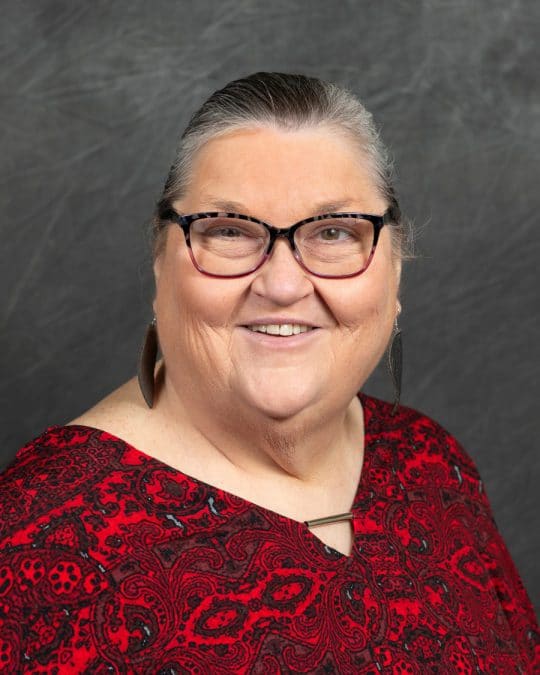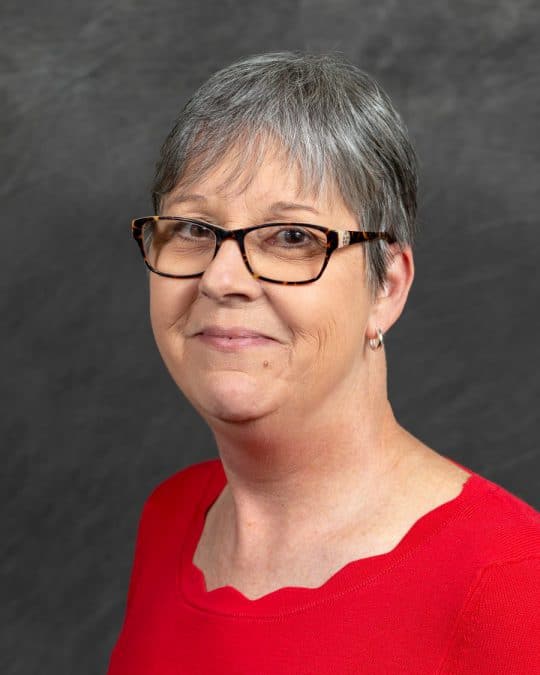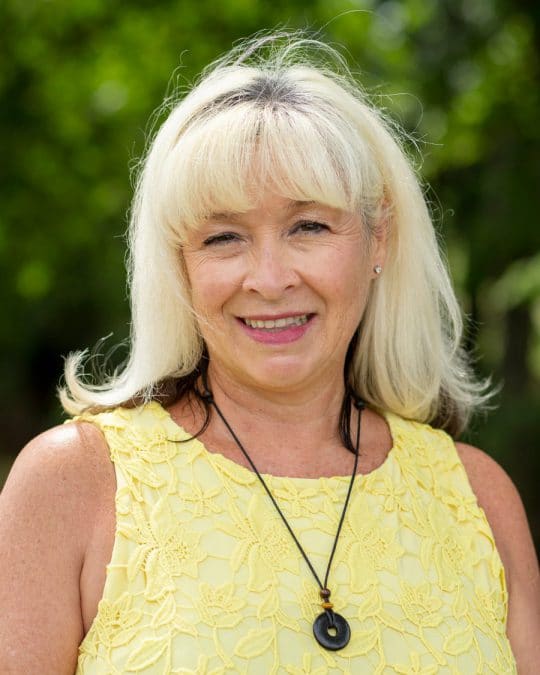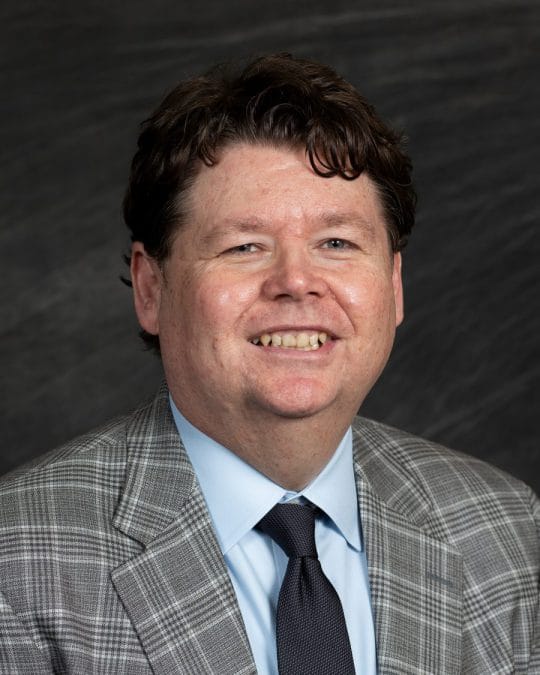The Citizen Potawatomi Nation District Court serves to enforce CPN tribal laws, uphold justice and guard Tribal sovereignty. The court oversees criminal, civil, Indian Child Welfare and juvenile proceedings under the direction of Chief District Judge Philip Lujan and Associate District Judges Robert Wiley and William Davis. A small group of talented behind-the-scenes staff members ensure the court carries out its duties. The Hownikan spoke with each court employee, and their responses have been lightly edited for clarity.
Andrea Gabel, court clerk

Andrea Gabel has served as a court clerk for both the CPN District and CPN Supreme Court for the past four years. As a Cherokee Nation citizen, she appreciates the opportunity her job provides to serve fellow Native Americans.
What does a day at work look like for you?
“The first thing I do is to prepare for court, then afterwards, work on the necessary documents that need to be filed, reviewed and scanned. I process the mail that comes in, and most of all, assist Tribal members that come to the administration building for information or to process documents and answer the phones.”
What are your key roles?
“I prepare for court, take notes during court, process the necessary documents from court and provide customer service to those who contact us for information.”
What does your work mean to you?
“It means everything, not just a livelihood, but pride, a sense of heritage and knowing that how far Natives have come and how far we can excel in future generations.
“It’s hard to describe how good it feels to be able to assist Potawatomi Tribal members and other Natives that live within the court’s jurisdiction. It brings more pride to the work that I do. It is just not providing customer service to someone; it has a family feel to it.”
What is something others may not know about your department?
“We go to specific trainings to better assist the Tribal members when the need arises. Both court clerks have achieved the Tribal Court Clerk II status from the National American Indian Court Judges Association and have received Certificates of Court Management for Tribal Judges and Personnel trainings from the National Judicial College. Those trainings are difficult — a lot to take in a short amount of time and then come back to implement our training.”
Describe the hardest part of your job.
“Seeing cases that involve children who are in a bad situation.”
What is your favorite part of your job?
“Witnessing a great outcome of a bad situation, like an adoption.”
Toni R. Sears, court clerk

Toni R. Sears, a court clerk within the CPN court, celebrated her sixth anniversary with CPN this spring. The Anderson descendant is thankful and proud of her work for the Nation.
What does a day at work look like for you?
“My day consists of checking emails for any required actions, answering questions over the phone and in-person, typing court documents, pulling files, working on court dockets, prepping the court room for court, witnessing and documenting each court session.”
What are your key roles?
“My key roles are all aspects of the day-to-day efficiency and documentation of the court.”
What is something others may not know about your department?
“Others may not know we do marriages and adoptions.”
Describe the hardest part of your job.
“The hardest part of my job is not being able to help someone.”
What does your work mean to you?
“It is rewarding to watch the actual court procedures and process in action and knowing I am a part of the court.”
Lisa B. Otipoby-Herburt, juvenile prosecutor

Lisa Otipoby-Herburt began working for CPN in October 2010 and currently serves as the children’s (juvenile deprived) prosecutor for the Nation’s court. She’s a citizen of the Comanche Nation and finds her career at CPN rewarding.
“It is an honor to work for a Tribe that demonstrates stability and accountability to the Tribal membership.”
What does a day at work look like for you?
“Generally, I have telephone calls or texts from FireLodge Children & Family Services workers to respond to while I’m travelling to the office. Once in the door, I meet with the FireLodge Children & Family Service’s director and/or caseworkers for updates on the open cases or to staff new cases requiring the attention of either that department or the court. I meet with the court staff to see if there are any matters requiring my attention. I then return to my office to draft pleadings or responses based on the staffings.
“Often I am preparing for court, or walking directly into court upon my arrival. On court days, I present, as necessary, before the court. Following court, I generally draft proposed orders for the judge’s approval based upon what happened in court that morning. I prepare responses for FireLodge Children & Family Services in certain guardianship cases and other state court proceedings, wherein the Nation has been noticed. There is never a dull moment and never down time when it comes to serving as the juvenile prosecutor.”
What are your key roles?
“Key roles include advising FireLodge Children & Family Services and preparing for court proceedings and presenting in court on behalf of the Nation.”
What is something that others may not know about the CPN court?
“Although the perception is that FireLodge Children & Family Services is about removing children from their homes, their ultimate goal is to reunify families by helping them gain parenting and life skills so children can be safe and thrive in their homes.”
If you had to pick only one aspect of your job that is your favorite, what would that be?
“It would be the day that a child safely reunifies with their family or a child finds their ‘forever’ home through adoption.”
Describe the hardest part of your job.
“Recognizing that a family will not likely be able to have a child returned to them because the home is not a safe environment. The decision will come after offering every service and reasonable opportunity to the family to be safe and provide for their child.”
What does your work mean to you?
“I serve the Citizen Potawatomi Nation. Everything that I do is a reflection upon the Nation and how it cares for its children and families. My work is important because it has the potential to impact the lives of our Tribal citizens for generations. I take that responsibility very seriously, and I intend that my work reflects that commitment.”
Kelley D. Harris, criminal prosecutor

Kelley Harris began working at the Nation in October 2009 as a criminal prosecutor. He is a citizen of the Cherokee Nation, and Harris assists with prosecuting criminal defendants who have committed crimes in CPN’s jurisdiction.
What does a day at work look like for you?
“I am usually here two days a week for criminal court and Healing to Wellness Court. We usually have criminal court dockets on Monday and Wednesday and Healing to Wellness Court on Wednesday afternoons. Our office receives police reports from Citizen Potawatomi Nation Police Department, and we review those reports. And if charges are warranted, we will file criminal complaints against the suspects. On criminal dockets, we can have arraignments, dispositions, reviews or trials depending on what stage the criminal case is at against the defendant who is charged with a criminal offense.”
What is something that others may not know about the CPN court?
“The Citizen Potawatomi Nation district court has a Healing to Wellness Court program for defendants that are charged with drug or alcohol related offenses to try and help those individuals address their addictions and get free of illegal substances, or alcohol addiction, so that they can have a positive impact in the community.”
If you had to pick only one aspect of your job that is your favorite, what would that be?
“Working with court personnel and the interactions with Citizen Potawatomi Nation law enforcement officers in trying to help those who have been victims of a crime.”
What is the hardest part of your job?
“Seeing so many young people with addictions to alcohol or illegal drugs and the impact that those addictions have on their lives now and into the future.”
What does your work mean to you?
“I have always enjoyed working with criminal law and have done so for over 20 years both as a prosecutor and representing criminal defendants as a public defender. I think I am fortunate to work for a Tribe that has many services for individuals charged with criminal offenses; through not only the Healing to Wellness Court program for illegal drug and alcohol addictions, but also through the CPN re-integration program to help defendants with employment and community sentencing options. All of these are important to reduce criminal recidivism rates and help the Tribal and local community.”
Mary Powell, court scanning clerk

Mary Powell is a Melott descendant, and prior to working with the court, she was the greeter and receptionist at the Cultural Heritage Center for seven years. Since the 1970s, she also held positions at First National Bank & Trust Co., FireLake Corner Store and oversaw the Nation’s first federally funded community health representative program. Although Powell tried her hand at retirement in 2014, the fellowship provided by working at the Nation inspired her to enter the workforce once more, and in 2018, she accepted her current position as the court scanning clerk.
What does a day at work look like for you?
“After the judge signs off, I take the (documents) and scan them. There’s a file for everybody that’s gone through our court system. But I scan that document and save what the document is about. I’ll put the date and court minute. It copies everything, and sometimes, there can be a lot of them. Especially when they have civil cases and juvenile or custody. It gets pretty busy.”
What are your key roles?
“My key role is to be here every day and keep those documents scanned and organized and getting the work done so that everybody else can do theirs. It takes all of us.”
What is your favorite part of your job?
“My favorite aspect is just getting up and being thankful that the good Lord let me wake up and gave me the ability to come to work. He saw fit to let me wake up this day to let me do my job.
“I feel a lot of pride. Because when I went to take the community health representative training back then, I had to go to Tuscan, Arizona, to be trained. I knew nothing really about the Tribe, although I served on the business committee. I went to the library and looked it up, and the only thing that I could tell the class in Tuscan was our (CPN’s) famous artist Woody Crumbo. I got up and talked about Crumbo. That’s all we had. We didn’t have anything. We didn’t even have the little white trailer. I worked out of my home.
“As far as the court here, I am very appreciative. I am very thankful. The two court clerks, and the Tribe has got two of the best court clerks; you can’t get any better. But of course, I think they have a good scanner, too,” she chuckled.
What is the hardest part of your job?
“I can’t really say that I’ve got a hard part. I am always afraid I’m going to be behind and not keep up, but I am comfortable in my skin. When you’re comfortable in your own skin, you don’t have those kinds of fears. You just let them go.”
What does your work mean to you?
“My work means a lot to me. Not only does it help with my livelihood, it gets me out amongst people. Although when I’m scanning, I am not a chatty Cathy, but it means a lot to me. It really does, and the opportunity to learn something new. My piece of advice is always be learning. Always learn something new and never feel that you can’t do it because can’t never could do anything.”
